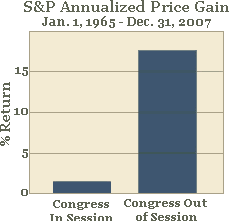In other words, don’t bother with Congress itself. Instead, focus on those times when they are not in session - i.e., the times when they can’t harm you with their busy work, not to mention their perks and porks.
If Congress ever heeded Thomas Paine’s dictum regarding the best government being the least government (which I doubt), they have long since trampled any such principle into the ground. In fact, this notion is so far buried that it would take a miracle to resurrect it.
What I have in mind is something that depends on no one but you and the wisdom of crowds:
- - - - - - - - -

Meet the Congressional Effect Fund.
Unlike our Imperial Congress, the CE Fund hasn’t been in operation long enough to have a track record. However, its basic raison d’être flows from the fact that when Congress is not in session, the stock market does well. When the boys come back to town, the market gets the blues - who wouldn’t?
The CE Fund says:
Historical research indicates that, more often than not, when Congress is in session there is a negative effect on equities markets (the “Congressional Effect”) due possibly to investor fear and uncertainty surrounding government action -- or possible action - as well as unintended adverse consequences on the stock market of Congressional legislative initiatives. For instance…
I. On October 24, 2007, the House of Representatives held hearings on legislative proposals to reform mortgage practices in an attempt to help consumers cope with rising numbers of mortgage defaults. On that one day, the Investors Business Daily (“IBD”) Group 196 Index, which includes Mortgage and Related Services Companies, fell from 577.64 to 559.17, suffered a decline of 3.2% across an entire industry…
You can see from the graph that merely one stupidly conceived hearing (can you say “governmental interference”?) can possibly be translated over the long term into a benefit for you.
Bear in mind that the graph does not include dividends, which would have made the differences even more remarkable.
Its founder says:
The Congressional Effect Fund is the first mutual fund to explicitly seek to minimize investor exposure to potentially negative impact of new and proposed Congressional legislation on the broad stock market.
The Congressional Effect Fund seeks to capture the historically higher returns on Congressional out of session days by primarily having exposure to price moves of the broad market as measured by the S & P 500 index on vacation days. The Fund does not try to capture the dividends of stocks in the index. Instead, it invests in interest bearing instruments including, without limitation, treasury bills, other government obligations and bonds, collateralized repurchase contracts, money market instruments and money market funds.
Here is some information on the manager of the CEF:
Eric Singer, Manager of the fund Advisor, Congressional Effect Management, first published an article on the general effect of Congress on daily stock prices in an article published in Barron’s in 1992. Since then the idea has attracted support and evidence from both the financial and academic community.
Mr. Singer has been a finance professional for over 25 years. Most recently his practice focused on raising funds for, and investing in, small cap public companies. During the 1990’s, he was head of Corporate Finance at Gerard Klauer Mattison & Co., a research oriented brokerage firm. In the 1980’s, he launched a corporate finance new products group at Smith Barney, and headed a similar group at PaineWebber. He also practiced law for several years and developed real estate.
The website has a prospectus available as a download, and it has the usual caveat regarding past performance vs. future results.
I posit that the past performance of Congress is well-established. If we could somehow find leaders with enough foresight and courage to actually lead us out of our malignant governmental quagmire, the US could perhaps grasp the wisdom of small government.
Meanwhile, a look at this fund is worthwhile. If it becomes successful, surely that will be the best messenger for Thomas Paine’s idea.
And, no, this fund is not “betting against our country.” It is lining up in its sights the great damage done in Washington and proceeding to take aim.

Hat tip: The Conspiracy to Keep You Poor and Stupid

0 comments:
Post a Comment